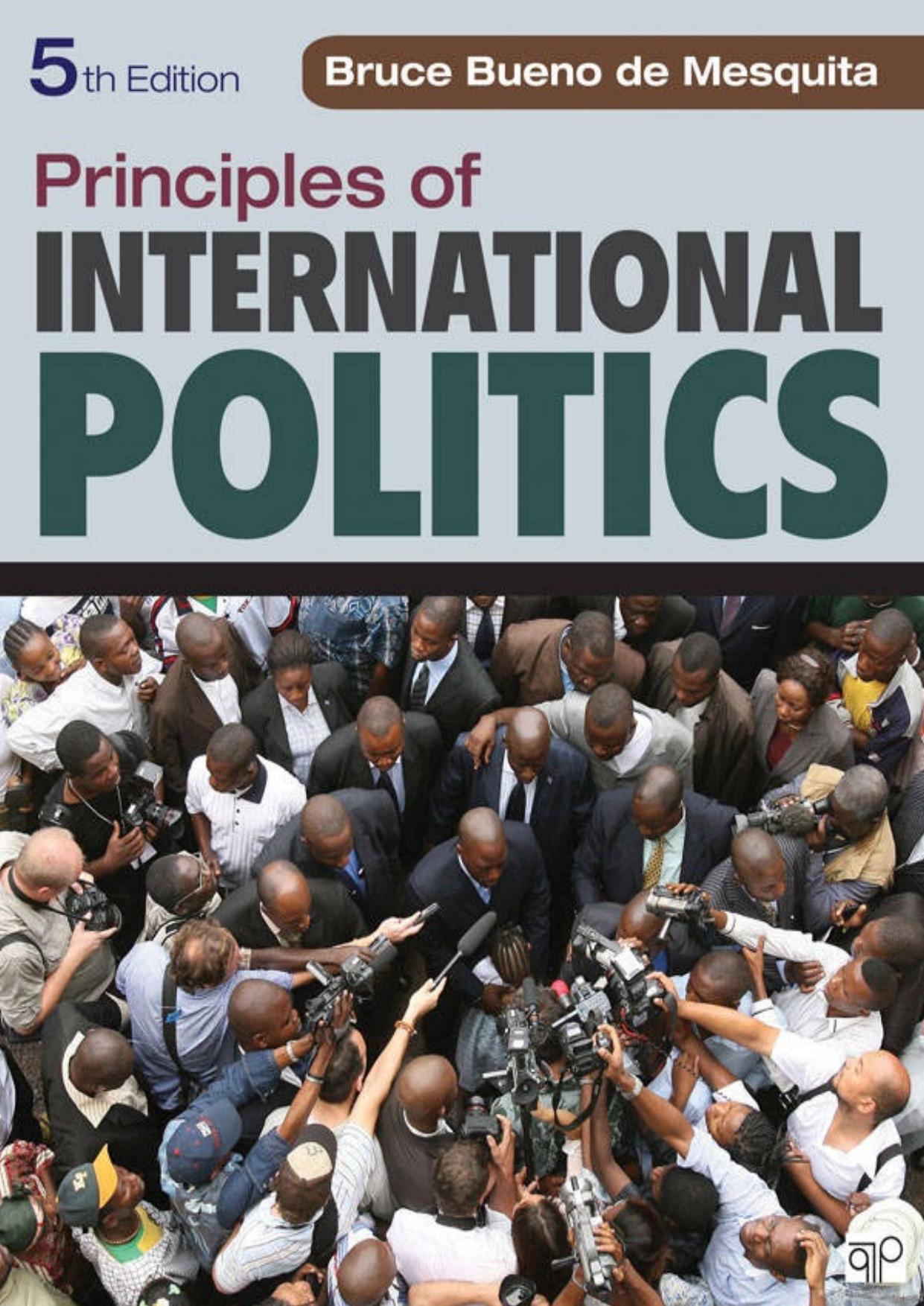Principles of International Politics 5th Edition by Bruce Bueno de Mesquita ISBN 1452202982 9781452202983
$70.00 Original price was: $70.00.$35.00Current price is: $35.00.
Instant download Principles of International Politics 5th Edition after payment
Principles of International Politics 5th Edition by Bruce Bueno de Mesquita – Ebook PDF Instant Download/Delivery: 1452202982, 9781452202983
Full dowload Principles of International Politics 5th Edition after payment
Product details:
ISBN 10: 1452202982
ISBN 13: 9781452202983
Author: Bruce Bueno de Mesquita
Renowned scholar Bruce Bueno de Mesquita, who set the standard for the scientific approach to international relations and transformed the field, has returned with a reformulated fifth edition based on extensive reviewer feedback and guided by an emphasis on questions about the causes and consequences of war, peace, and world order. More than ever before, the strategic perspective in international relations is examined with complete clarity, precision, and accessibility. What hasn′t changed is Bueno de Mesquita′s commitment to covering the fundamentals of IR. The foundational topics and examination are all there: the major theories of war, the domestic sources of international politics, an exploration of the democratic peace, the problems of terrorism, the role of foreign aid, democratization, international political economy, globalization, international organizations, international law, and the global environment. The first part of the book, “Foundations”offers highly accessible coverage of key concepts, introducing students to different ways to think about the national interest and showing them how to use game theory and the strategic perspective/selectorate theory to better understand what happens in all aspects of international affairs. This section uses debate over North Korea′s nuclear weapons development as an ongoing example to build concepts and build confidence in the student′s how of basic modeling ideas. Also covered is a basic, intuitive introduction to game theory and other evidence and logic based tools for analyzing international relations. Part II, “War,” next provides a more thorough evaluation of how domestic political incentives and the domestic institutions of governance shape choices about conflict initiation, escalation, and termination. It also surveys major theories of war and conflict, working through hypotheses derived from constructivism, neo-realism, liberalism and selectorate theory and evaluating them against the evidence to see what actually works and what doesn′t.Chapters in Part III, “Peace,” build on the logic of collective action to help students see why it is so difficult to get national governments to do “what is right” even when they can agree on what is right, with chapters covering the effectiveness of international organizations and international law, as well as a thorough evaluation of environmental issues, human rights enforcement and the domestic and the international political economy of trade. Part IV, “World Order” emphasizes efforts to promote the spread of democracy and economic prosperity. It also addresses how to understand and deal with terrorism. Whether examining terrorism, the spread of democracy or the alleviation of poverty, chapters in this section carefully examine which strategies work, which do not, and why. The Arab Spring provides a useful ongoing example of the strengths and weaknesses of foreign aid policy and military intervention policies. No other introductory text delivers such an easily-understood contemporary explanation of international politics, while truly enabling students to learn how to mobilize the key concepts and models themselves—thus develop a new method for thinking about world affairs. More than ever before, Principles provides a comprehensive evaluation of all aspects of international affairs, systematically compares the accuracy of competing approaches to international relations, and walks students through the simple, intuitive models and games that capture the essence of the strategic, selectorate viewpoint.
Principles of International Politics 5th Table of contents:
1. Evaluating Arguments about International Politics
What Is a Theory?
Constructing Theories
Judging Theories
The Importance of Logical Consistency
Truth and Falsity in Assumptions
The First Principle of Wing Walking
The Case Study Method and Testing Theories
A Standard for Comparing Theories
The Scientific Method
When a Theory Is Wrong
Scientific Theories Must Be Falsifiable
Practical Uses of Theories
Summary
2. The Strategic Perspective: When Foreign Policy Collides with Domestic Politics
International Politics: Domestic Politics with a Twist
The Afghan Taliban’s Problem in 2001
The Israeli Prime Minister’s Problem
Who and What to Study in International Affairs
The Strategic Perspective
Domestic Theories of International Affairs: A First Look
Selectorate Theory
Public and Private Goods: Who Gets Rewarded as W and S Change?
The Value of Being Needed When W/S Is Small
The Value of Being Needed When W/S Is Large
The Loyalty Norm (W/S) and Conventional Regime Types
Leader Survival
Summary
3. Tools for Analyzing International Affairs
The Example: North Korea’s Nuclear Policy
The Median Voter Theorem: A Spatial Model
Assumption 1: Unidimensionality
Assumption 2: Single-Peaked Preferences
Assumption 3: Majority Rule
Win Sets: The Median Voter and Issue Linkage
Expected Utility
Computing Expected Utilities
Probability
Combining Probability, Costs, and Benefits
Summary
4. An Introduction to Game Theory
Prisoner’s Dilemma: Illustrating a Simple Game
Simple Games with Multiple Equilibria
A Simple North Korea-US Nuclear Game: An Extensive Form Game
Subgame Perfection and Backward Induction
Counterfactual Reasoning
Solving the North Korea-US Game with Uncertainty
Summary
5. Why War? The Big Picture
War, Clarity, and Uncertainty
Seeking Compromise When a Dispute Is about an Indivisible Good: Winner-Takes-All
War, Compromise, and Uncertainty
War, Compromise, and Commitment Problems
Realist Theories of War
How Well Does Neorealism Do in Explaining War and Instability?
Bipolarity and Stability
Neorealism’s Bipolarity Hypothesis Does Not Follow from the Theory’s Assumptions
Bipolarity and Stability: A Second Look
History and Neorealist Empirical Claims
Other Neorealist Hypotheses and the Historical Record
The Survival of Essential and Inessential States
Balance of Power and Neorealism
The Power Transition: A Structural Alternative to Neorealism
Examples of International Rules and Norms
Dissatisfaction, the Status Quo, and War
Summary
6. Domestic Theories of War
The Domestic Politics of International Crises
When Might War Be Ex-Post Efficient: Thatcher and the Falkland Islands War
Audience Costs
Solving without Audience Costs
Solving with Audience Costs
Crisis Selection in Democracies and Autocracies
Diversionary War
The Resurrection Hypothesis
Pacific Dove Hypothesis
Selectorate Theory and the Conduct of War
Selectorate Reasons for War
War-Selection Calculations
Selectorate Theory and War Effort
War Effort Logic
Evidence for the War Effort Logic
War Effort, War Loss, and Leader Deposition
Summary
7. How International Organizations Work or Don’t Work
The Purpose of International Rules and Institutions
The Problems of Rivalry and Nonexcludability
The Collective Action Problem
Organizational Solutions to Collective Action
Cooperation through Repeated Bilateral Interaction
Flexibility Can Be a Virtue
Information, Reputation, and the Value Added by Institutions
Multilateral Organizations and Cooperation
Inclusiveness: Trade-Offs between Regime Efficiency and Effectiveness
Alternative Views of Inclusiveness
The United Nations: Shallow Decisions or Inaction
Summary
8. Global Warming: Designing a Solution
Global Warming: A Problem of Collective Action
Collective Action and Free Riding
Seeking Agreement: Allocating Abatement Costs
Shallow Agreements = Compliance; Deep Global Agreements = Failure
Monitoring and Punishing Noncompliance with Kyoto
Flexibility
Were Kyoto’s Lessons Learned?
An Illustrative Strategy for Reduced Global Warming
Summary
9. Human Rights, International Law, and Norms
What Is International Law?
International Regimes: The Idea of Ideas and Norms
What Rights Are Recognized as Human Rights?
Is Poverty a Credible Argument against the Enjoyment of Human Rights?
Why Promote Freedom Rights? Some Useful Facts
Does International Law or Norms Improve Human Rights?
Human Rights: The Constructivist Case
The Strategic Case
Sovereignty: The Case against Human Rights
International Borders as Institutions
Breaking Down the Unitary Actor View Can Improve Human Rights
Summary
10. Free Trade or Fair: The Domestic Politics of Tariffs
Government’s Minimalist Role in Trade
Trade in Historical Perspective
An Economics Primer
Comparative Advantage
Supply and Demand
Politics of Trade: Adding Tariffs to the Mix
Trade as a Public or Private Good
Trade and Domestic Winners and Losers
The Consequence of Free Trade: Some Evidence
Summary
11. Globalization: Internatoinal Winners and Losers
Globalization’s Goals
Currency Mobility
Factors of Production
Mobility of Factors of Production
Interindustry Factor Mobility
No Interindustry Factor Mobility
Specific Factor Mobility
Some Evidence
Summary
12. Foreign Aid, Poverty, and Revolution
Foreign Aid: The Problem
The Marshall Plan: A Model for Foreign Aid?
Aid Outside Europe: Not a Pretty Picture
The Aid Debate
A Third Explanation for Aid
Giving and Getting Aid
Evidence for the Aid Hypotheses
Aid, Revolution, and Democratization
Summary
13. Can Terrorism Be Rational?
Beliefs about Terrorism
Terrorism, Credible Commitments, and Strategic Dilemmas
The Government’s Credibility Problem
Solving the Credible Commitment Problem
Why Violence Might Increase after Successful Negotiations
Land for Peace: A Credible Commitment Problem
Summary
14. A Democratic World Order: Peace Without Democratization
The Democratic Peace
Some Evidence
Explanations of the Democratic Peace
Pacifying Benefits from Trying Hard
Enforcing the Postwar Peace
Democracy: A Hindrance to Democratization
Democracies and Nation Building
Autocracies and Nation Building
The United Nations and Nation Building
What Do We Expect, and What Does the Evidence Show?
Germany and Japan: Seemingly Hard Cases
The Usual Suspects: Iran, Congo, and Other Failed Cases
People also search for Principles of International Politics 5th:
5 principles of international law
basic principles of international law pdf
principles of international political economy pdf
principles of international politics



